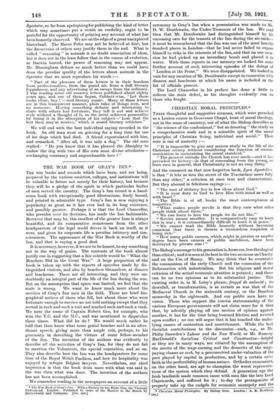THE WAR BOOK OF GRAY'S INN.*
THE war books and records which have been, and are being, prepared by the various societies, colleges, and institutions will be valuable in future not merely for their history, but because they will be a pledge of the spirit in which particular bodies of men served the country. The Gray's Inn record is a hand- some book with exceptionally good illustrations, finely bound, and printed in admirable type. Gray's Inn is now enjoying a popularity as great as it has ever had in its long existence, and possibly greater. Perhaps it is that the Lord Chancellor, who presides over its destinies, has made the Inn fashionable. However that may be, this smallest of the greater Inns is always beautiful, and its comparative remoteness from the other headquarters of the legal world drives it back on itself, as it were, and gives its corporate life a peculiar intimacy and con- sciousness. The appearance of the War Book is worthy of the Inn, and that is saying a good deal.
It is necessary, however, if we are to be honest, to say something not in the way of praise. The contents of the book almost justify one in suggesting that a fair subtitle would be "What the Benchers Did in the Great War." A large proportion of the book is taken up with the reports of speeches made by dis- tinguished visitors, and also by benchers themselves, at dinners and luncheons. These are all interesting, and they were un- doubtedly an integral part of the life of the Inn during the war. But on the assumption that space was limited, we feel that the scale is wrong. We want to know much more about the services of Gray's Inn men in the field. There are brief bio- graphical notices of those who fell, but about those who were fortunate enough to survive we are told nothing except that they served in such and such a unit and reached such and such a rank. We note the name of Captain Robert Gee, for example, who won the V.C. and the M.O., and was mentioned in dispatches three times. What did he do ? We would much rather be told that than know what some genial bencher said in an after. dinner speech, giving more than ample rein, perhaps, to his generosity in describing the virtues of some fellow-member of the Inn. The intention of the authors was evidently to describe all the activities of Gray's Inn, for they do not fail to mention the Volunteers, the special constables, and so on. They also describe how the Inn was the headquarters for some time of the Royal Welch Fusiliers, and how its hospitality was enjoyed by refugee Belgian lawyers. Nevertheless, our chief impression is that the book deals more with what was said in the war than what was done. The intention of the authors has not been accomplished.
We remember reading in the newspapers an account of a little
• The War Book of Gray's Inn. With a Preface by the Right Hon. the Viscount Birkenhead. London : Published by order of the Masters of the Bench by Butterworth and Company. [15s. net.] ceremony in Gray's Inn when a presentation was. made to afx. D. W. Douthwaite, the Under-Treasurer of the Inn. We read then that Mr. Douthwaite had distinguished himself by his unceasing care for the tenants of the Inn during the air-raids_ it must be remembered that the Inn was one of the most heavily .bombed places in London—that he had never failed to expose himself to risks in the interests of the Inn, and that on one occa. sion he had picked up an incendiary bomb and placed it in water. With those reports in our memory we looked for some further account of such interesting episodes of the doings of "London at the Front." We were disappointed. We looked in vain for any mention of Mr. Douthwaite except in connexion with dinners and luncheons at which his name is included in the list of officials present.
The Lord Chancellor in his preface has done a little to redeem the main defect, as his thoughts evidently run on those who fought.


































 Previous page
Previous page